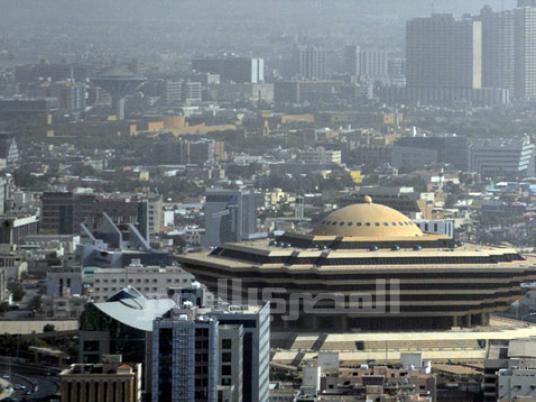
The detention of Egyptian human rights lawyer Ahmed al-Gizawy by authorities in Saudi Arabia last week spurred popular outrage that has forced Egypt’s de facto leader, Field Marshal Hussein Tantawi, to call senior Saudi officials in an attempt to restore calm after the kingdom recalled its ambassador in Cairo and closed its diplomatic missions in Egypt Saturday.
Gizawy’s arrest unleashed anger at the often-ignored record of human rights violations against Egyptian prisoners in Saudi Arabia and a perception that the Egyptian Embassy in Saudi Arabia doesn’t do enough to help.
Political activists started a sit-in in front of the Saudi Embassy on Tuesday after reports that Gizawy was sentenced to one year in prison and 20 lashes in absentia on charges of insulting Saudi King Abdullah bin Abdul Aziz. However, Saudi Ambassador Ahmed Qattan denied these reports, and an embassy statement released later said Gizawy is charged with smuggling controlled drugs into the kingdom. Gizawy confessed to the smuggling, according to the Egyptian ambassador to Saudi Arabia.
Gizawy had previously filed a lawsuit against the Saudi monarch and authorities that accused them of the arbitrary detention and physical abuse of Egyptians in Saudi Arabia, which many think was the reason for his arrest.
“Saudi Arabia is sad about Mubarak’s fall and it is punishing Egyptians for that,” said presidential hopeful and labor rights lawyer Khaled Ali outside the Saudi Embassy in Cairo, where he joined the protesters last week.
Ali argued that the Saudi regime is afraid that Egypt’s revolution will be exported.
“I believe [Saudi authorities] deliberately targeted Gizawy because he was defending Egyptians there,” he said. “Also, looking at how Egyptian pilgrims were mistreated in Saudi airports last year shows that they intentionally insult Egyptians.”
Gizawy’s case has gained media coverage and activist support, but many Egyptian migrants are incarcerated in Saudi Arabia’s prisons and stripped of their human and legal rights, often for years. Families of the detainees have been organizing protests and meeting with Qattan as well as the Egyptian foreign minister since 2008.
Israa Kamal, wife of Abdallah al-Demerdash, a communications engineer, told Egypt Independent that her husband was arrested four years ago at his workplace in Khubar and has been in detention since then without trial and without being informed of what his crime was.
“They say only that it’s a national security case. But I found out that Saudi authorities told human rights organizations based in the kingdom that he is being punished for his political views on Palestine and Iraq,” said Kamal. Demerdash shared his political opinions on social media websites.
Demerdash called Kamal six months after his arrest, but he is not allowed to talk about his case or the conditions of his imprisonment, and is allowed only one phone call per year, she said. But Kamal had not heard from her husband for two and a half years until she received a phone call from him two weeks ago.
“He is completely isolated from the outside world. In the last call he asked me if we are in winter or summer. He didn’t know about the Egyptian revolution and while I was explaining to him that Mubarak is gone, the officer threatened him that we can’t discuss the revolution or else he would end the call,” she said.
According to Kamal, no lawyer was allowed to defend Demerdash because he was never formally tried before a court.
The Saudi government announced in December 2011 that there were 1,401 Egyptians in Saudi prisons charged in criminal cases, but did not reveal the names and charges of political prisoners. The Egyptian Organization for Human Rights has published on its website the names of 35 political prisoners who the Saudi authorities call “terrorists,” according to Hafez Abu Saeda, the organization’s director.
“People get detained for years without a trial or formal interrogation. It’s is almost impossible to contact them or follow up on their cases. They are prohibited from their right of litigation, they are mistreated and tortured to confess,” Abu Saeda told Egypt Independent.
The human rights advocate says that there is an alarming lack of transparency from the Saudi administration about the status of Egyptian prisoners in Saudi Arabia. Even the Egyptian embassy in many cases is not allowed to contact the detainees, especially if they are accused of crimes related to Saudi’s national security.
Even when detainees are tried, their trial are usually unfair as they are not given the right to appoint a lawyer, verdicts are determined beforehand, and sentences are harsh and don’t match the crimes, added Abu Saeda.
Youssef Ashmawy Youssef, a 29-year-old computer engineer, has been held captive in the kingdom for three years. His crime was logging on to a banned website, the Saudi embassy told his mother, Nadia Saddiq, after she spent years going around the Saudi embassy and the Egyptian Foreign Ministry asking for information about her son.
Saddiq, who began protesting with other detainees’ families before Egypt's 25 January revolution, told Egypt Independent that communications with Youssef were suddenly cut off for four months after he called to say he was in solitary inprisonment in Riyadh with no trial.
Youssef’s family then filed a lawsuit accusing former President Hosni Mubarak and the Foreign Ministry of abandoning their son.
“His life is being wasted in jail without a reason or trial. We don’t know when he will be released,” said Saddiq.
Mostafa Ahmed al-Baradei, 24, was arrested from his workplace in a library in Abha and has been held in solitary confinement in an underground prison since 2009, also with no clear accusation. His mother has met with the Foreign Affairs Ministry and Qattan, who she said promised the release of her son. He is still in prison.
Abu Saeda argues that Saudi law actually allows for these violations as it contradicts all human rights standards.
One of the main reasons for the suffering of Egyptian migrant workers in Saudi Arabia is the restraining kafala (sponsorship) system, which gives employers full control of workers' residency permits. Workers cannot change jobs or exit the country without written consent from their initial employer or sponsor.
More than 48 percent — 923,600 — of Egyptian expatriates live in Saudi Arabia, according to a recent report about the Kafala system conducted by the Egyptian Organization for Human Rights.
“Kafala is very much like slavery as it is not based on a contract in which both parties state their rights and obligations, which allows the employer to confiscate workers’ passports, withhold their wages and accuse them of fabricated crimes, which leads to their detention,” said Saeda.
Egyptian Foreign Minister Mohamed Kamel Amr and his counterpart Prince Saud al-Faisal have vowed to resolve the Gizawy issue. The fate of other Egyptians in Saudi prisons remains uncertain.




